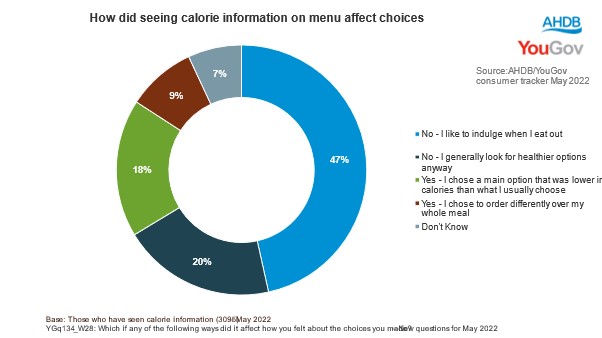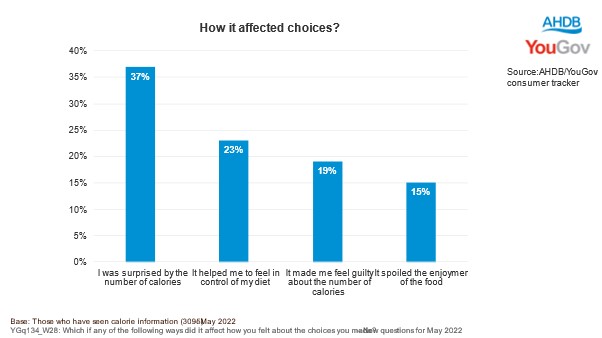Does the addition of calorie information to menus pose a threat to mental health?
Thursday, 28 July 2022
As a nation, we Brits love eating out. Far from the old-fashioned stereotypes of British food being bland and stodgy, eating out in the UK has now become a smorgasbord of different cuisines, cultures, and gastronomy. Indeed, 81% of us have gone out to eat in the last four weeks (Source: Worldpanel online Eating Out panel June 2022).
Many of us see eating out as a real treat. It’s an opportunity to celebrate special occasions, get together with friends, or just escape the routine of daily cooking. In many ways, it’s an opportunity to indulge. However, it is this sense of indulgence that has come under pressure since new rules have been introduced that means food service outlets now have to state the number of calories on menus. The goal is tackling Britain’s obesity crisis and to help consumers make healthier food choices when eating out, but some people aren’t on board.
The consumer response has been mixed. According to the latest figures (May 2022) from our AHDB/YouGov consumer tracker, over half (54%) of restaurant goers have noticed this calorie information on menus.
How is it affecting consumers’ choices?
Almost half (47%) of consumers said the information did not affect their choices as they preferred to indulge when eating out. A further 20% claim they would choose healthier options in any case. This leaves only one in four that would opt to change some element of their meals as a result of the calories information being on the menu.

Beyond the numbers, though, it is the emotional response to being confronted with this information that further division emerges. While 23% agreed that it helped them to feel in control of their diets, 19% said it made them feel guilty about the calories consumed. A further 15% said that it spoiled their enjoyment of the food.

The industry needs to be cautious here. While the number of obese people does put pressure on an already over-stretched health service, there is another serious health threat that arguably receives less media attention. According to Beat Eating Disorders, approximately 1.2m people in the UK suffer from an eating disorder. This can represent a huge challenge to mental and physical health. For those suffering from an eating disorder, being confronted with calories on menus may be a trigger for negative thoughts and feelings.
Possible alternatives
It is a legal requirement for food service outlets over a minimum size to provide calorie information on menus at the point of purchase. However, could there be scope for calorie information to be presented in a more subtle way on request as a reasonable adjustment for those people who may struggle with this? Using QR codes to allow people to access the information if they wish, or perhaps separate menus without the information available on request? These options could offer choice rather than forcing the information upon people whether they want it or not. It would also provide sensitivity for those facing the incredible challenge of living with an eating disorder, struggling with the sort of everyday behaviour that the rest of us take for granted. This might require legislative change but could be something for lawmakers and industry bodies to consider in future.
On a more positive note, however, in the same AHDB/YouGov study, 37% people felt surprised by the number of calories in certain dishes, so there may be some opportunity to highlight the health benefits of some lighter meat dishes. A plainly grilled piece of lean steak or pork served with fresh salad or vegetables can be a low-calorie, tasty option that is high in protein and other nutrients such as vitamin B12 and may be better for those wanting to manage calorie intake compared to some other alternative dishes such as pasta or veggie burgers. This shows that British red meat and dairy can be part of a healthy, balanced diet and that is definitely a message that the industry can get behind.

Sign up to receive the latest information from AHDB
While AHDB seeks to ensure that the information contained on this webpage is accurate at the time of publication, no warranty is given in respect of the information and data provided. You are responsible for how you use the information. To the maximum extent permitted by law, AHDB accepts no liability for loss, damage or injury howsoever caused or suffered (including that caused by negligence) directly or indirectly in relation to the information or data provided in this publication.
All intellectual property rights in the information and data on this webpage belong to or are licensed by AHDB. You are authorised to use such information for your internal business purposes only and you must not provide this information to any other third parties, including further publication of the information, or for commercial gain in any way whatsoever without the prior written permission of AHDB for each third party disclosure, publication or commercial arrangement. For more information, please see our Terms of Use and Privacy Notice or contact the Director of Corporate Affairs at info@ahdb.org.uk © Agriculture and Horticulture Development Board. All rights reserved.

